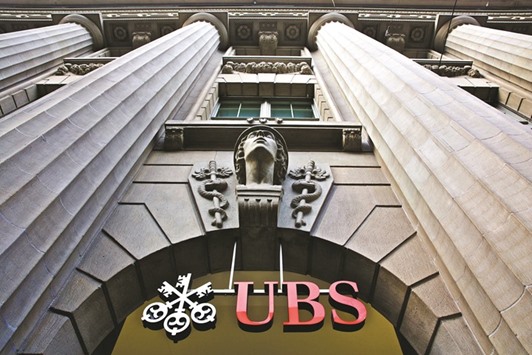Record-low interest rates and wild market swings are eroding profit at Europe’s banks, with no end in sight.
From UBS Group’s wealth-management unit to Commerzbank’s consumer-lending business, income is shrinking as margins get squeezed and clients avoid trading. Executives at the banks, two of Europe’s largest, warned not to expect an improvement soon.
“Commerzbank and UBS confirmed structural difficulties at European banks with generating profits when interest rates are at record lows,” said Mario Spreafico, who oversees €1.5bn ($1.7bn) as chief investment officer at Schroders Wealth Management Italy. “Banks can only seek to improve their earnings through aggressive cost cutting.”
Lenders across the Continent are struggling to increase revenue as the European Central Bank pushes interest rates below zero, regulators demand bigger capital buffers and market volatility spooks investors. While the banks have already fired thousands of workers and sold off billions of euros of assets, their best option to boost profit is to keep cutting, investors said.
Societe Generale, the second-largest French lender, said yesterday it will cut an additional €220mn of costs by the end of 2017, bringing savings across the bank to €2bn. Chief Executive Officer Frederic Oudea told Bloomberg Television it’s not clear when the bank will be able to reach a goal for a return on equity of 10%. The measure of profitability was 7.1% in the first quarter, even as improved consumer-banking results lifted net income.
“At the moment, all management can do is keep costs under control and this won’t change any time soon,” said Gary Kirk, founding partner at London-based TwentyFour Asset Management, which oversees £5.4bn ($7.9bn) of fixed- income assets, including UBS and Commerzbank bonds. “European banks have a major earnings challenge.”
Those concerns have driven the Bloomberg Europe Banks and Financial Services Index down about 21% this year, leaving its 39 members trading at an average of 0.68% of book value. That means they are worth less than investors would expect to receive if the firms liquidated assets. The index was down 0.9% in London yesterday. Five large European lenders that reported results on Tuesday and Wednesday - UBS, Commerzbank, BNP Paribas SA, HSBC Holdings and Societe Generale - have a combined 19 operating divisions with businesses ranging from French credit cards to US stock trading. Revenue fell in 17 of them.
At UBS, Chief Executive Officer Sergio Ermotti has staked his bank’s future on managing the fortunes of the world’s wealthiest. This model came under pressure as rich clients avoided risk and the lender carried out an “abnormally low” number of transactions on their behalf, Ermotti told analysts.
UBS’s investment bank, meanwhile, posted its worst first- quarter performance since the financial crisis as deal-making slumped. The unit’s costs, which fell 26% to 1.5bn Swiss francs ($1.57bn), are still too high, leaving it at the mercy of turbulent markets, according to Christopher Wheeler, an analyst in London with Atlantic Equities.
Ermotti, who has cut staffing at UBS by more than 4,000 since taking charge in late 2011, is looking at “tactical adjustments to its cost base,” he said.
The surprise was that management did not signal more aggressive cost control to respond to what Ermotti called “paralysing volatility,” Morgan Stanley analysts led by Huw van Steenis wrote in a note to clients.
While UBS is the biggest manager of money for the wealthy, Commerzbank is the largest lender to the Mittelstand, the mass of small and mid-sized companies that form the backbone of the German economy. Operating profit at its Mittelstand unit tumbled 43% to €209mn from a year earlier because of negative interest rates and regulatory levies.
It’s “obviously a very difficult environment,” Chief Financial Officer Stephan Engels said in an interview on Bloomberg Television on Tuesday. Germany’s second-biggest lender, which fell the most in more than three years after first-quarter profit slumped, will “look at all the levers available,” he said.
ECB President Mario Draghi has reduced interest rates and expanded a program of monthly bond purchases to stoke economic growth across the euro-area amid a global slowdown. About 81% of banks across the currency block reported a decline in their net interest margins, or the difference between what they pay for deposits and charge for loans, over the past six months, the ECB wrote in an April 19 report. In Spain, where souring property loans forced the country to seek a bailout, low interest rates are now a risk for lenders and may affect their solvency, the nation’s central bank wrote in its May Financial Stability Report. The banks should seek more efficiency through cost savings, the Bank of Spain wrote.
Some investors say the pessimism is overdone. While the start of the year was “devastating,” there are signs the situation is improving, said Lutz Roehmeyer, who helps manage about $12bn at Landesbank Berlin Investment GmbH.
BNP Paribas, the biggest French bank, said on Tuesday that client business at its global markets unit recovered at the end of the first quarter. Pretax profit at the corporate and investment bank dropped by more than half in the period as trading revenue sank.

A sign hangs above the entrance to UBS headquarters in Zurich. From UBS Group’s wealth-management unit to Commerzbank’s consumer-lending business, income is shrinking as margins get squeezed and clients avoid trading.
